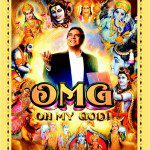I am delighted to have been given a review copy of Saffron Cross: the unlikely story of how a Christian Minister married a Hindu Monk.
It’s a memoir that I first heard about on Twitter and Patheos Book Club gave me the chance to review it. The book when it arrived was smaller than I expected, but it turned out to be densely packed with insight and spiritual growth. I thought I’d finish it in a day, but it took a week of solid reading! I found myself making notes and underlining phrases.
Dana is the kind of open-minded Christian that we need more of. She is able to feel the presence of the divine in the sacred spaces of other religions (an experience that I have also had). Sadly, she’s taking a lot of flak for it. Because so many Christians are obsessed with a single narrative, they think she and her husband are going straight to hell and that her willingness to sit through Hindu worship services is idol worship and invalidates her journey with Jesus. Sad.
I came to the Hindu temple because I knew that God was just as present here as in Baptist sanctuaries and Catholic cathedrals. Beautiful, expansive God was mercifully showing up as Jesus, Spirit, Vishnu, and Krishna.
See, if more religious folk (myself included) understood this, the world would be a much more pleasant place!
I admire Dana for being so incredibly honest in this book. She really lays herself bare and makes herself remarkably vulnerable. She admits to her weaknesses in spirituality and I think she should give herself more credit because she has been willing to engage in trying to understand the divine in a way that most never do. Most are content with their narrow story and don’t explore outside of it.
She’s willing to travel to a place where she is in the religious minority. As I’ve said before, I think that’s an important experience to have. She’s able to step outside of her familiar experience of being a member of the dominant faith of her region. Even more so for her since she lives in “The Bible Belt” (a part of the U.S. that is particularly known for a strong dedication to Christianity and a lack of knowledge of other faiths). I’m amazed at Fred’s ability to live in this area. I would love to live in N.C. and be close to my beloved aunts. The only thing that holds me back is a reluctance to raise children in an area that is so saturated with Christianity. I’m very sensitive about Christianity encroaching on my life, though I think I’m getting better at relaxing about it!
Each day, humans are inundated with messages of intolerance and hate. A message of love and understanding seems like an anomaly. As our country becomes more pluralistic, it will be imperative to develop empathy and relationship skills to interface with people who have different beliefs. –Interview with the author addressing why she wrote this book.
I feel like Dana and I would get along in real life! Mostly because I recognized a kindred spirit in the way that she loves to explore and talk about religious issues. That thirst for spiritual conversation seems to be what she first fell in love with in her husband. I also seek out those kinds of conversations and am endlessly interested in hearing about how people find meaning in their lives. I’m amazed that I feel this way, since I don’t associate Baptists with respect or open-mindedness.
I can see through this book how having such a dramatically interfaith relationship is causing growth in Dana’s spiritual life. When your partner has different fundamental practices and beliefs from you, you have to engage with your religious practices and really work to understand. That’s a great (though very challenging) thing!
I think one weakness is the framing of Hinduism as a single tradition. Though Fred’s particular sect is mentioned, there are a lot of times when things are said about what Hindus do or what Hindus are like and it doesn’t take into account Hindus who are not “Gaudiya Vaisnava” (Trust me, most Hindus eat plenty of onions!)
Some of the parts with Fred explaining things made me think about stuff in my own practice.
In particular he talked about how prayer is different between Hindus and Christians. He said there are no spontaneous prayers from Hindus. Our prayers are set mantras and chants and our rituals are specific. This is unlike Protestantism in America where there’s a sort-of running monologue with God. Fred objects to the way Christians seem to treat God as a vending machine, praying for good parking spots.
Now, I do think Hindus also beg God for things. Material and ridiculous things too. We just approach how to get those things differently. For a Hindu, a particular ritual is the way to reach God to ask Him for what we want.
There’s a tendency for Dana to see the community of Hindus as more spiritually advanced than she. I think that’s just her own insecurity. People are people. Hindus and Christians both have some members who don’t quite “get it” and others who are dedicated to Truth and everything in between.
It is true that for devout Hindus, God is a part of everything and everywhere. It isn’t something to engage with one day a week, but something that is woven through every moment of life. I suspect it’s that way for some Christians too, though the structure of Christian churches maybe doesn’t encourage it in the same way that a home altar and daily pujas does.
The issue of whether Hindu worship is idolatry by Christian standards is a big one.
It’s most of the way through the book before Dana addresses it directly. She gives Fred’s guru’s explanation and I think those Christians who would be willing to read the book fully and with an open mind might find it quite a good answer. It sounds like it’s still something that Dana wrestles with.
One thing I would have liked more of is the Christian side of things. I think because she’s writing for an audience familiar with Christianity Dana spends most of the book explaining and showing the Hindu side of things. She talks about them going to a church each week as well as a Hindu service and I’d like to know more about the church experience they were having. (It’s there, I just wanted more!) I guess there’s a lot about her journey as a child and young adult and what brought her to being a minister. I was curious to see more of that from after her marriage.
They visit Fred’s monastery from his monk days, but do they go on Christian retreats? They listen to lectures from Fred’s guru, but do they go to listen to lectures by renowned pastors? There are times when the story doesn’t seem balanced and it appears as though Christianity is actually getting the short end of the stick! That might just be an effect of how the story is told, though. As I said, it is written for an audience more familiar with Christianity than with Hinduism.
I also wondered about how being a minister factored into Dana’s day to day life. Does she make a living as a minister? Is her divinity degree something she’s using on a daily basis? Or does she work in a different field now? I wasn’t sure.
As Fred and Dana travel to Vrindavan and a Hindu monastery in California, I think about my own quiet practice. I wonder if my religious life is becoming a little bit stale. I might need to shake things up and dig in deeper rather than coasting along with what I’m doing. I’m grateful to the book for inspiring me to continue to grow my faith and not become complacent.
The biggest insight in this story, though, is how valuable it is to engage with those who have different visions of divinity. When we only hang out with those who worship the same way we do, it’s easy to become stale in the practice. When you have to explain or defend or show how you worship, you gain new insight into it and new dedication. I applaud Dana and Fred for being willing to make that faith-deepening a daily experience!













